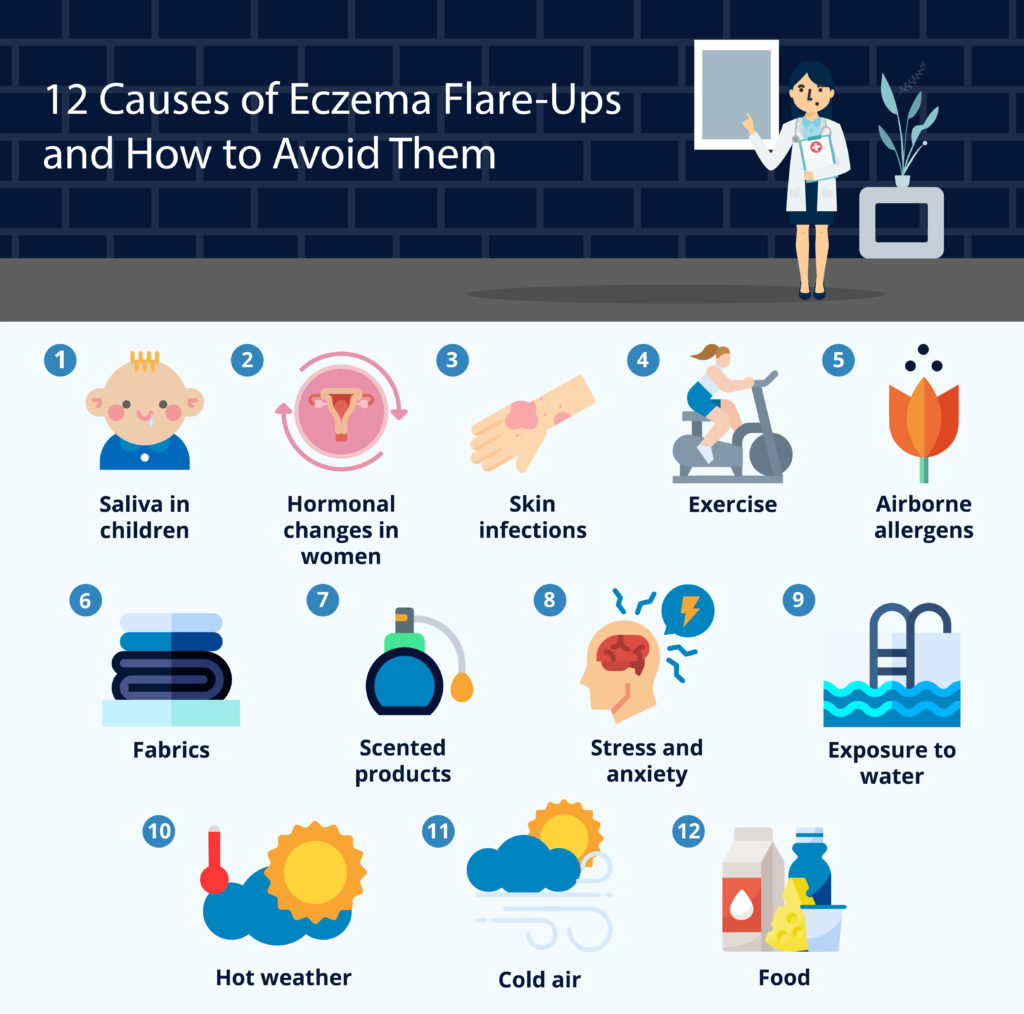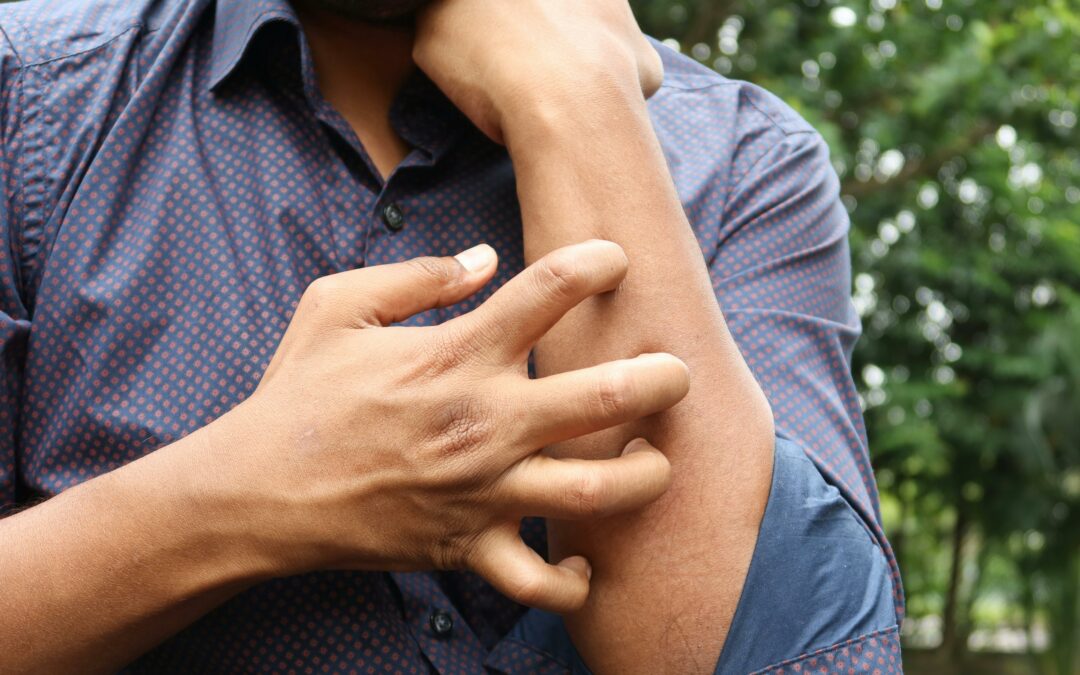
The true cause of why people suffer from eczema, or this redness, dryness, itchiness, and inflammation of the skin, is still unknown. But there are reasons why this skin condition gets triggered, and it is important to be aware of them. While you can always purchase over-the-counter medications, prevention is still better than cure, you can use an app to do so.
Listed below are some of the most common causes of eczema flare-ups. Look at them and see if these are what might be triggering your unhappy skin condition.
1. Saliva in children
This is most common in babies and younger children because they have sensitive and delicate skin. Drooling can cause flare-ups around the mouth, cheeks, and chin. Excessive wiping can also worsen it with the appearance of itchy red spots and patches.
To avoid this, make sure to moisturize the skin around the mouth using safe and nontoxic creams. You can choose the best products for children here.
2. Hormonal changes in women
For women, moments like menopause, pregnancy, and the menstrual cycle can influence eczema. A decrease in estrogen makes the skin dull and dry, unable to maintain moisture, thus making the skin condition worse.
To avoid this, talk to your doctor about regulating your hormones. During these moments, moisturize your skin more than ever. Learn more about balancing your hormones here.
3. Skin infections
Having fungal, viral, and bacterial infections can cause eczema symptoms to flare up. You can only get these infections if a disease, illness, or wound is left untreated. The most common ones are staph infection, ringworm, and herpes simplex virus. Learn more about detecting skin infections here.
To avoid this, ask your doctor for the right antibiotic, antibacterial, antiviral, or antifungal medication.
4. Exercise
Though exercising is good for overall health, excessive sweating from workouts can cause eczema symptoms to worsen. But do not sacrifice exercising entirely. There are a lot of things you need to consider when you want to exercise despite having this skin condition. To know more about it, read here.
If you notice flare-ups after working out, try lessening the intensity of your movements. You can also choose a cooler time of the day, such as early morning, to do your workout.
5. Airborne allergens
Examples of airborne allergens include dust mites, pollen, pet dander, and mold. These can cause eczema symptoms to flare up.
To avoid this, keep your home clean. Regularly dust your furniture and vacuum the areas. Replace and wash your bedding once a week. You also might want to think about ditching the carpets and sticking with normal floors instead. If your allergies appear, ask your doctor for antihistamines. Did you know that early exposure to allergens can help overcome them?
6. Fabrics
Take note if you are allergic to certain fabrics. Polyester and wool are the most common fabric materials that can make the skin itchy and red.
To avoid this, refrain from wearing clothes that make you itchy and uncomfortable. If you have no choice but to wear them, make sure you have a protective layer made of skin-friendly fabrics to shield your skin from having contact with the fabric.
7. Scented products
Fragrant items such as perfumes, detergents, soaps, and other personal care products can worsen eczema symptoms. When the affected area encounters these chemical substances, it might further irritate the skin.
To avoid this, look at the labels carefully. If possible, choose the ones that are unscented and hypoallergenic such as these items listed here.
8. Stress and anxiety
When you are stressed and anxious, the body releases cortisol, which increases inflammation. This will then trigger the eczema symptoms to flare up.
To avoid this, try doing meditation and deep breathing. You can look at some meditation apps and start relaxing. Rest well and do some light exercises to cope with stress. Managing your stress can help keep the flare-ups at bay. If you cannot do these things alone, you can talk to therapists for additional help.
9. Exposure to water
Getting your skin exposed to water when swimming or taking a bath can trigger eczema flare-ups. The longer you stay drenched in water, the drier your skin can get, which can lead to constant itching.
To avoid this, make sure to use lukewarm water for your bath. Apply lotion or moisturizer after swimming or bathing to prevent the skin from drying.
10. Hot weather
Like extreme workouts, hot weather can cause sweating which can irritate the skin and lead to itching.
To avoid this, stay in cool places if the weather gets hot. Drink plenty of water to cool down the body. Do not stay under the sun and make use of fans or air conditioning units.
11. Cold air
Cold and dry air or generally cold weather can remove the skin’s natural moisture. It can cause itching and inflammation due to constant scratching.
To avoid this, double up on your application of lotions or moisturizers. During this weather, twice a day is the bare minimum. You can also put a humidifier inside the house.
12. Food
Depending on your allergies, food can cause eczema symptoms to flare up. Even if you do not have allergies, common inflammatory foods include sugar, refined carbohydrates, gluten, red meat, and dairy products. The effects can immediately be seen.
To avoid this, check the foods you eat. Even if you do not have allergies but it is causing your flare-ups, you must remove certain foods from your diet. List down everything you eat and drink so you can track the pattern of the flare-ups. You can also talk to your doctor to further discuss your allergies to an expert and be tested. Do not forget that the NALA app can help. Simply send a message or email to [email protected] so you can be onboarded.
Final thoughts
If you know what is causing your eczema flare-ups, you will be able to manage your skin condition well and you can use the NALA app to do so. Being aware of these listed items will make you more prepared for possible triggers and easily avoid them. Be updated on your day-to-day activities to monitor what might be causing your eczema flare to worsen. By knowing the causes and avoiding them, your skin condition can improve drastically.



My mother is bedridden and has a feeding tube in her stomach. Her skin from her buttocks, upper legs and groin are very irritated. We have tried multiple creams and have no idea what else to try. Mom has always suffered frim dry skin but it looks like a severe case of exzema.
I found this article very informative. It is comprehensive discussion of the many factors that increase the risk of excema. It also made me think about the interaction between risk factors for excema.
I don’t think my cause of eczema is there